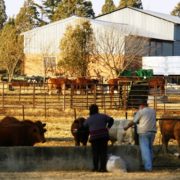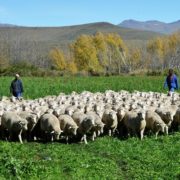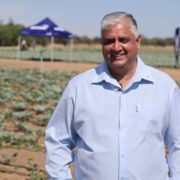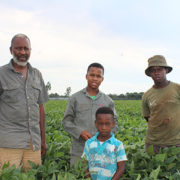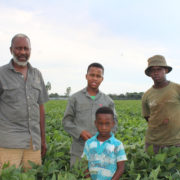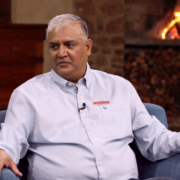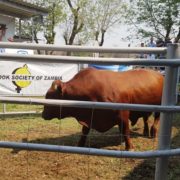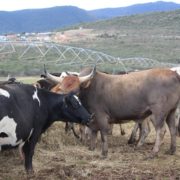Strategise succession planning – African Farming
The family farm remains the backbone of agriculture worldwide. It is a successful model capable of securing food supply to regional and national communities. But it needs maintenance, and planning for succession is a critical element of that maintenance.
A farmer’s reputation, perhaps especially when it comes to livestock, is a significant component of his or her marketing ability and of the asset that the next generation inherits. “You can never start building a reputation too soon, especially if you want to hand over the reins to your children or to a partner,” says Vleissentraal agent Lizemari de Klerk.
Children from farming families often want to farm, and there can be no better legacy to leave them than the practical farming skills they have known since childhood. But young people need an enabling environment if they are to succeed in the tough, competitive world of agribusiness today. The landscape is littered with examples where bad or even non-existent succession planning has led to the loss of the family farm. Along with this comes the loss of potentially talented and much-needed young farmers who switch to careers in other fields if they are deprived of the opportunity to run their own farming businesses.
Flexible thinking is a hallmark of good agricultural succession planning. Farmers must consider complex factors such as “equal and fair” distribution of assets that may not be possible if the business is to continue in the family.
Brits farmer Gopolang Tladinyane, who sees farming as a multigenerational business, is in the fortunate position of having three sons who all want to farm. “My biggest task is to acquire this farm so that I can hand it over to my children,” he says. Tladinyane’s two older sons are already involved in the business, bringing their energy, their creativity and their tech abilities to the enterprise.
Generational wealth goes beyond the passing on of land, money and assets. It encompasses the transfer of knowledge and skills, and the confidence to take calculated risks, to innovate and to operate with courage in a challenging environment.
For more information, visit www.vleissentraal.co.za
Legacy and transition in the livestock sector – African Farming
There are about 40 000 commercial farmers in South Africa operating businesses with annual turnovers ranging from R1m to R10m and more. It is more difficult to determine the numbers of smaller scale emerging and subsistence farmers who turn over less than R1m a year but who are also important role players in agriculture.
The stories of successful commercial farmers, black and white, are often rooted in childhood memories of working with animals or tending to crops. Commercial farmer Gopolang Tladinyane from Brits in the North West herded goats as a child and says working with livestock is his first love, although crop farming is the primary activity on his farm.
The knowledge that aspiring young farmers gain from their farming fathers, mothers and grandparents is incredibly valuable and lays down a solid foundation for a successful farming career.
“Training is an essential part of succession planning. Involve your successors while they are young; educate them, give them the capacity they need to succeed in farming,” says Ratselane Marumo of animal health company Afrivet. Afrivet has invested heavily in creating training programmes that support emerging communal livestock farmers, teach them about herd and flock health, and strengthen their capacity to manage stock productively. The company models a working plan for succession as it focuses on the transfer of knowledge and expertise to the emerging sector.
Commercial livestock farmers have also been part of a positive process by providing opportunities to black farmers and helping them become part of the red meat value chain, where they can realise profits from their livestock. South African farmers possess a wealth of generational knowledge and many of them are actively passing on this knowledge. Black farmers who have shared their stories with African Farming have spoken with respect and gratitude of the mentoring, guidance and practical help offered by their white neighbours. These efforts form part of a greater succession strategy in which the country’s reforms stretch to the construction of a new and inclusive agricultural legacy that will secure a good future for all South Africa’s farmers.
To find out more, visit www.afrivet.co.za
Up close and personal with Gopolang Tladinyane – African Farming
WHAT IS THE BEST CAREER MOVE YOU HAVE MADE SO FAR?
Switching from engineering to farming. I have never regretted doing this.
YOUR BIGGEST SUCCESS TO DATE?
Giving my sons the kind of encouragement that nudged them into the farming world. It makes the world of difference having them on board, and so enthusiastic about our business and the farming.
WHAT KIND OF RELATIONSHIP DO YOU HAVE WITH NEIGHBOURING FARMERS?
I have good relationships with my neighbours and I aim to keep it that way. Many farmers coming into the game, don’t realise that your neighbours are the people who can mean the difference between success and failure in your farming operation. If it weren’t for good neighbours who were happy to help me, and decent mentors, I certainly would not be where I am today.
WHAT ADVICE WOULD YOU OFFER ASPIRANT FARMERS ON THE THRESHOLD OF A CAREER IN AGRICULTURE?
Don’t let the size of the land limit your options. If you need more land, you can always lease, and you can farm intensively rather than extensively. Farming beef on pastures allows me to carry more animals than I would otherwise be able to do on my 100ha and stay profitable. I would also say, get your kids involved and start teaching them about the rands and cents from a young age.
Advice on succession planning for farmers – African Farming
African Farming host Tony Ndoro is joined in studio by Nico Groenewald, head of Standard Bank’s Agribusiness division, Vleissentraal agent Lizemari de Klerk, Ratselane Marumo of animal health company Afrivet and Praveen Dwarika of Afgri’s Lemang Agricultural Services, who offer advice on succession planning.
Success in family farming – African Farming
Farming seems to come easily to Gopolang Tladinyane and his sons, Motlapele and Reaobaka, who are happily dedicated to their family team and to their farming business. Gopolang knows the value of early learning in agriculture and finance, and has made his boys profit-sharers in the business. The Tladinyanes ‘talk farming’ to Peter Mashala of African Farming.
It’s Friday and Gopolang Tladinyane’s eldest sons, Motlapele (16) and Reaobaka (13), have just arrived on the farm from boarding school. After dropping off their bags, changing and wolfing down a quick snack, they’re off to see what needs to be done before sundown. Rea, in Grade 8 at Hartbeespoort High School, is the mechanic and manages the small stock on the family farm in Sanddrift, about 20km north of Brits in North West.
He’s just checked whether there is anything urgent waiting to be fixed in the workshop. “Everything seems to be running smoothly; the tractors are in good working order, except one that needs the top gasket replaced. I can have it finished in no time, then I can focus on the livestock,” he reports.
Motlapele, in Grade 11 at Bekker High School in Magaliesburg, looks after the grain production. Helping with the spraying of the soya beans tops his to-do list. They finished planting sunflowers two months ago on 50ha in Bethanie, about 20km west of their farm, he says. These will be ready to harvest in June. “Right now we need to rake and bale the lucerne that’s been cut. The market is starting to peak as winter gets closer.”
A DREAM COMES TOGETHER
Motlapele and Rea farm with their father, Gopolang, a well-known Simmentaler and Simbra stud breeder. They grow dryland sunflowers on communal land they lease in Bethanie, whereas the home farm of 100ha in Sanddrift is dedicated to producing feed for the intensive livestock operation of 60 Simmentaler and Simbra breeding cows, 80 Meatmaster sheep and 100 Boer goats.
“We moved here in 2004. The boys have known the system from a young age and have always taken part in farm activities,” Gopolang says. He believes it was natural for them to start taking more responsibility as they grew in their self-appointed roles. “I just had to guide and teach them a few things.”
It’s a dream come true to have his boys join him on the farm, according to Gopolang. His third son, Baatile (5), is at Thornhill Primary School and always wants to go farming with his dad. His three sons were all born on the farm.
“Farming is a multigenerational business; you don’t get it right with the first generation. The next generation builds on what was left by the previous one,” Gopolang says. He, too, is from a farming family and learnt from his father, who farmed on communal land in Jericho, Gopolang’s birthplace. His dad still farms Brahman cattle.
“My maternal grandfather was also involved in farming at a commercial level in the 1950s. He started as a farm worker and ran his own animals on the farm. Later he bought about 60ha of land,” he says. However, apartheid laws meant that his grandfather could not expand, and so he moved to Botswana, where some of Gopolang’s relatives still farm near Lobatse. Gopolang says he remembers the day when he was in Grade 12 and saw a poster advertising farmland for sale.
“It was during the apartheid period, yet I was brave enough to walk into those offices for advice on how to buy a farm,” he says, smiling. “Nothing came of the visit, but it was those little things that made me realise I wanted to become a farmer.”
In 2007 that destiny was fulfilled when Gopolang, by then a qualified mechanical engineer working as a project manager at BMW SA in Rosslyn, bought the farm in Sandrift through a Land Redistribution for Agricultural Development (LRAD) grant and a Land Bank loan. He and his wife moved from Pretoria North with their two small children.
At that stage Gopolang had already started farming part time with his father and was running cattle. Eager to learn and solve problems, he visited other cattle farmers on weekends to get practical advice, which he would apply to his own herd. During this time he was introduced to Simmentalers and was highly impressed with the breed’s milk production. He bought his first Simmentaler stud cow in 1998 and two years later registered as a breeder with the Simmentaler and Simbra Breed Society.



BEEF ON PASTURE
The transition from farming communal land extensively to farming an intensive system was a challenge. “Irrigation farms are highmaintenance,” Gopolang admits. Fortunately he got on very well with the previous owner of the farm, who introduced him to the local farmers. On their advice, Gopolang was soon planting irrigated pastures, repairing fences and renovating the house.
At the time he had 10 Simbra heifers. Using the balance of his LRAD grant, he bought 10 Simmentaler heifers from Callie Lee, a respected stud breeder who farmed further north. Callie later became his mentor. Gopolang’s Simmentaler and Simbra herd grew from 20 breeding cows in 2009 to an 80-cow unit run on an intensive system by 2015.
“We’ve had to reduce the herd to 60 cows since to make more land available for fodder production,” he explains. With good pasture management and a decent fodder flow plan, he says, it is possible to carry more than 60 animals on 100ha. The approved stocking rate is 1 large stock unit (LSU) to about 10ha in a low-rainfall area, but Gopolang says the stocking rate can be increased on pasture.
“There are almost 100 cattle, if we include the 20 heifers and 10 young bulls that we normally have on the farm at any given point. This is why I have 35ha of planted pasture under irrigation.” Gopolang’s friend, James Wallis, a retired Extension Officer who worked at the Brits Department of Agriculture and has a degree in pasture management, helped him plan the fodder flow. He rotates soya beans and maize on about 15ha; 10ha is permanently planted to lucerne; and about 10ha is planted to oats in winter.
They plant maize in August and harvest it in November to make silage, Gopolang says. “The silage is ready just before winter begins and we start feeding it out to the cattle from May, depending on the veld condition.” He rates maize silage highly for increasing growth, maintaining the condition of the cows and boosting their milk production. When used strategically at different times of the year, Gopolang adds, maize silage is a valuable feed in a pasture-based system like his, and he can maintain his stocking rate.
“Immediately after harvesting the maize in November, we plant soya beans, which we harvest in May. These we sell at the Brits Coop, and we feed out soya-bean hay with silage. In winter we put the cattle onto planted oats, which is especially good for freshly calved cows,” says Gopolang.
According to him, a hectare of winter oats can sustain five animals from June to September. After the early rains, between September and October, he moves the animals onto the veld so that he can plant summer pastures. There are two breeding seasons: the summer calving period is between October and February, and winter calving is between June and July. The herd achieves an average weaning weight of between 230kg and 240kg, according to Gopolang. “Providing licks in winter and summer is a must,” he adds.


FLOCK MANAGEMENT
Rea proudly explains how his department works. “Our sheep and goats are mainly on the same grazing system as the cattle.” He says his father has allocated each of his sons shares in the sheep flock. “We have 20 sheep each, including Dad.” Even though they all have a share in the flock, Rea explains, it’s his responsibility to look after the sheep and goats.
“I make sure their body condition is good and that they are in good health. We record lambing ewes and their lambs, and tag them using coloured tags to assign ownership. My colour is blue.” The goats and sheep are vaccinated with One-Shot Ultra 7 to prevent blackleg, gas gangrene and pneumonic pasteurellosis,
among others. Rea says they also use Glanvac 3, which protects against cheesy gland, pulpy kidney and tetanus. They have one breeding season, with the lambing season starting in September.
“We vaccinate in August, about two to four weeks before lambing, so that lambs can get immunity through the colostrum,” Rea explains. Lambs are weaned at three to four months. “Young rams are fattened and sold, whereas the young ewes are kept so we can build the flock. I sold about 10 of my own young rams last year and used some of the money for a go-cart. The rest I saved,” he says.
Motlapele has been driving the sunflower project and, although they had a disappointing yield last season, he’s looking forward to better yields this season. “We planted late; the winter got us and we had poor yields of about 200kg/ha. But this season we planted on time, so we’re hoping for a good harvest,” says Motlapele. He says this will be their last year in Bethanie, as they plan to move the grain production to communal land in Jericho.
“We are de-bushing at least 100ha there, which we will plant this season. We’d like to increase the planting to 200ha in the following season so that we can grow four crops in rotation on 50ha each. The sugar graze will be used for silage and lablab as fodder, to help us increase sheep numbers,” Motlapele explains. He and his brothers have shares of 5ha each in the sunflower operation.
“I’m responsible for the production, but we share the proceeds from the 15ha equally,” says Motlapele. He also does contract work for other small-scale farmers, especially in surrounding communal areas.
“This season I’ve worked about 300ha as a contractor, ripping, disking and planting. I’d love to expand the grain operation, first by using available communal land and then maybe in future getting a private farm with more arable land,” Motlapele concludes. Focused on the present but planning for a big future, this dream farming team seems ready to take on the challenges of agriculture and win all the way.
Winning principles in farm management – African Farming
Farmers need a wide range of management skills to run their businesses well. This management is at the heart of every successful farming operation. Establishing and implementing a system of sound management principles ensures sustainable businesses and a generational legacy.
The fundamental principles of farm management – crop management, spraying programmes, mechanisation, planting schedules – are things that farmers get right most of the time, says Praveen Dwarika of Lemang Agricultural Services. Yet there is more to running a business than being competent at the basics.
“Issues like human resource management and labour relations are skills farmers should have at their fingertips when work force management is required,” he explains. Managers have a responsibility to guide and supervise the people who work in their businesses, and this is where leadership skills are most evident. Clear direction, encouragement and positive feedback all help to build capacity in the workforce.
Good people management is a tool that helps farmers hold on to their skilled staff members and gives them a competitive advantage. Part of the manager’s duty in managing human resources is to stay abreast of government regulations and comply with, among others, regulated working hours and conditions, tax, minimum wages and health and hygiene requirements.
Now, as never before, farmers must develop business skills if they are to stay profitable. “Applying business principles to operation management is the make or break of farm businesses. Making money, even a considerable amount of it, doesn’t necessarily translate into bankable profit,” cautions Dwarika.
Because financial factors are so important in farming, Lemang Agricultural Services offers new era farmers a short course in farm business management that covers basic business skills for small-, micro-, and medium-scale enterprises. The course includes budget planning, communication, commodity systems and safe operation on the farm.
Farmers learn to understand the agricultural industry and agricultural production, and how to apply entrepreneurial principles to farming. These critical skills help farmers build their enterprises into profitable ventures.
Responsible veterinary product management – African Farming
Resistance to medication and treatments is a massive problem in animal and human health today. There is little doubt that at least some of this resistance has developed because of irresponsible and, in some cases, ignorant handling of veterinary products. Every livestock farmer bears the responsibility of taking this aspect of management very seriously.
Livestock management embraces a holistic approach to animal health. Stock managers need to be alert during daily inspection of herds and flocks, as early diagnosis of disease means early treatment, which gives the medication a good chance of working towards a quick recovery. Dips, dewormers and vaccines are applied according to a seasonal schedule, which the farmer should work out with his vet every year.
Ratselane Marumo, sales and marketing manager at Afrivet, says management of medication and other veterinary products plays an important role in animal health. “Products must be stored properly to retain their efficacy,” he emphasises. “Some must be stored out of direct sunlight, some must be refrigerated and some must be stored under lock and key for safety reasons.”
Above all it is important always to read the package inserts that accompany the products. These inserts contain information about the products as well as directions on dosage and administration methods. Marumo cautions that failure to administer treatment correctly can cause production losses and animal deaths. If there is the slightest doubt or hesitation about dosage or method, the package insert is the best way to get the necessary details.
Product storage rooms should be clean and dry, and contain a fridge. Vaccines may not be effective if they are not stored at the recommended temperatures; antibiotics are heat sensitive; and many products are light sensitive. Managers should try to keep products of the same class together to avoid confusion and run regular product stock checks.
Diligent and responsible veterinary product management is part of farm biosecurity and helps the farmer get the best value from these products.
For more information, visit www.afrivet.co.za


